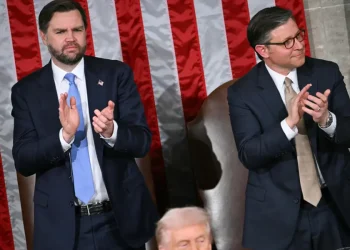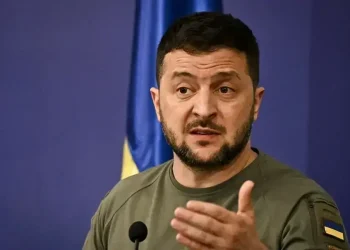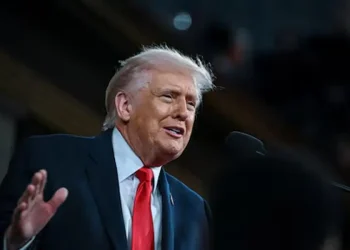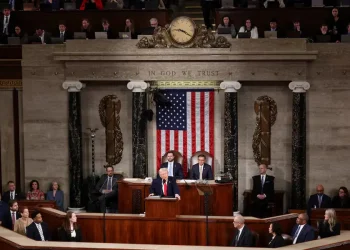BERKELEY, Calif. (news agencies) — Charles Darwin’s theory of evolution. Stephen Hawking on the Big Bang. Millions of students for civil rights and against the Vietnam War.
They were provocative in their times, products of an ideal that holds universities as sacrosanct spaces for debate, innovation — and even revolution. But Hamas’ deadly Oct. 7 attack on Israel and the resulting war in Gaza are testing that perception, as anger over the brutal military campaign collides with election-yearpolitics and concerns about antisemitism in places where freedom of expression is supposed to rule.
“Where there is much desire to learn, there of necessity will be much arguing, much writing, many opinions; for opinion in good men is but knowledge in the making,” wrote poet John Milton, an alumnus of Cambridge University, in his 1644 treatise against censorship in publishing. “Give me the liberty to know, to utter, and to argue freely according to conscience, above all liberties.”
That lofty principle has clashed with the stark reality of the Israel-Hamas war. Hamas militants who crossed the border killed about 1,200 people and took about 250 hostage. Israel’s drive to root out Hamas has killed more than 35,000 people in Gaza, according to the local health ministry, and left millions on the edge of famine.
Administrators on some campuses have called in local police to break up pro-Palestinian protesters demanding that their schools divest from Israel in demonstrations that Israel’s allies say are antisemitic and make campuses unsafe. From Columbia University in New York to the University of California, Los Angeles, thousands of students and faculty have been arrested in the past month.
“Columbia,” read one sign held aloft there after arrests on April 30, “Protect your students (Cops don’t protect us).”
Historically, universities are supposed to govern — and police — themselves in exchange for their status as “something of a secular sacred ground,” said John Thelin, University of Kentucky College of Education professor emeritus and a historian of higher education.
“One has to think of an American college or university as a ‘city-state’ in which its legal protections and walls include the campus — grounds, buildings, structures facilities — as legally protected, along with a university’s rights to confer degrees,” he added in an email. Calling in the police, as administrators did at Columbia, Dartmouth, UCLA and other schools, represents the “break down of both rights and responsibilities within the campus as a chartered academic institution and community,” he said.
The crackdowns are reviving memories of student-led protests during the American civil rights movement, the Vietnam War and the pro-democracy demonstrations in Beijing’s Tiananmen Square.
Student activism in the 1960s led campus officials to call law enforcement. And on May 4, 1970, the National Guard opened fire on unarmed students, killing four at Kent State University. Four million students went on strike, temporarily closing 900 colleges and universities. It was a defining moment for a nation sharply divided over the Vietnam War, in which more than 58,000 Americans were killed.
A half-century later, the Israel-Hamas conflict has lit another fuse, with claims that “outside agitators” have infiltrated the protests to inflame tensions.
“The scale, fierceness, the short time frame since the Hamas attacks, the irreconcilable demands of current competing protestors, and their occasional violence, has tested university leaders on how to respond,” said John A. Douglass, a senior research fellow and professor of public policy and higher education at the University of California, Berkeley.
Most major colleges and universities have their own police departments, “but inviting and soliciting help from local community police departments in riot gear, and not only called on to disperse encampments but protect rival protestors from each other, is a relatively new phenomenon,” he said.
What’s lost when the police are called in?
“Trust between the university and significant parts of its most important constituency: its students,” said Anna von der Goltz, a history professor at Georgetown University. The cost, she said, also potentially includes the university’s credibility “as a community that is capable of setting its own rules and dealing effectively with violations of those rules.”
The wave of pro-Palestinian protests on U.S. campuses took inspiration from demonstrations at Columbia that began on April 17.
As protesters set up their encampment that day, the university’s president, Minouche Shafik, was called for questioning before Congress, where Republicans accused her of not doing enough to fight antisemitism on the school’s Manhattan campus. The next day, university officials called in the New York City police, who arrested more than 100 protesters — among them, the daughter of Democratic Rep. Ilhan Omar, who had questioned Shafik in Washington.
Similar scenes played out across the country: The University of Southern California canceled its main graduation ceremony after disallowing its student valedictorian, who is Muslim, from giving her keynote speech. Police arrested hundreds of protesters at New York University and Yale. At Dartmouth College in Hanover, New Hampshire, President Sian Leah Beilock called in police to dismantle a pro-Palestinian encampment just a few hours after it went up.
Inspired by the protests in the United States, pro-Palestinian encampments popped up in the U.K. andEurope earlier this month as administrators there confronted the same question: Allow or intervene?
At Cambridge University, idyll of Darwin and Hawking, an encampment of about 40 tents in front of the Gothic spires of King’s College appeared disciplined and orderly after three nights, with a posted schedule that included meals, training, traditional Palestinian kite-making — and strict message discipline as passersby stopped to talk under rare sunshine.










 American Dollar Exchange Rate
American Dollar Exchange Rate